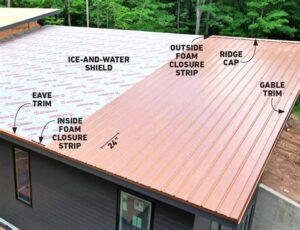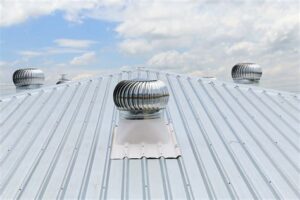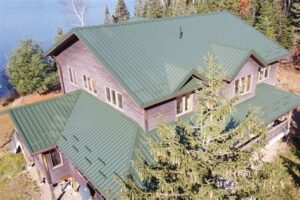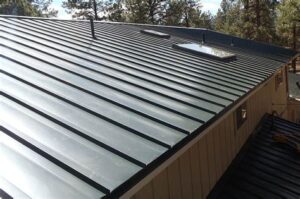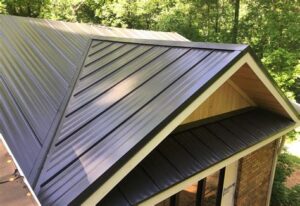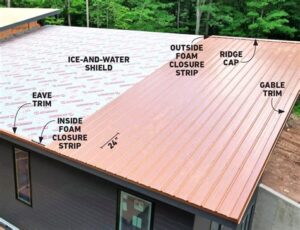When it comes to roofing, homeowners often find themselves weighing their options between metal and shingle materials. Both choices offer distinct advantages, but which one is the right fit for your home? This article delves into the benefits of metal roofing, exploring its long-term durability and innovative features that make it a wise investment. We’ll contrast key differences between metal and shingle systems, providing a comprehensive cost analysis to help you make an informed decision. By the end, you’ll understand why many are opting for metal roofing, not just for its aesthetic appeal but for its unparalleled resilience. Let’s navigate this crucial aspect of home improvement together and uncover which roofing material might be the ideal choice for you.
Understanding The Benefits Of Metal Roofing For Your Home
When it comes to roofing options, many homeowners often wonder, is metal really a viable choice compared to more traditional materials like shingles? The answer is a resounding yes. Metal roofing offers a wide range of benefits that make it an appealing option for many households.
One of the primary advantages of metal roofing is its remarkable durability. Unlike shingle roofs that can be prone to damage from harsh weather conditions such as hail or heavy winds, metal roofs are designed to withstand these elements, often lasting 50 years or more with minimal maintenance.
In addition to durability, metal roofing is also highly energy-efficient. It reflects solar radiant heat, which means it helps keep your home cooler in the summer months, reducing the need for excessive air conditioning and ultimately lowering your energy bills.
Another significant advantage is the environmental aspect. Many metal roofing materials are made from recycled content and are fully recyclable at the end of their lifespan. This eco-friendly feature can contribute to a smaller carbon footprint for your home.
Moreover, metal roofs come in a variety of styles, colors, and finishes, allowing homeowners to customize their choice to fit their aesthetic preferences. From sleek contemporary designs to traditional styles, there’s a metal roofing option to suit every taste.
The installation of metal roofing can be quicker than that of shingles, saving time and labor costs. And since it can be installed over existing shingles, it can also reduce the expense and hassle of a complete roof replacement.
While many people ponder is metal roofing the right choice, the benefits of durability, energy efficiency, recyclability, aesthetic variety, and faster installation make it a compelling option for homeowners looking to invest in a long-lasting and effective roofing solution.
Key Differences Between Metal And Shingle Roofing Systems
When considering roofing options, understanding the key differences between metal and shingle roofing systems is crucial for making an informed decision. Below, we outline the primary distinctions that can impact your choice:
1. Material Composition
Metal roofing is typically made from aluminum, steel, copper, or zinc, providing a strong, durable surface. In contrast, shingle roofing is made from asphalt, wood, or fiberglass materials, which may offer less longevity compared to metals.
2. Lifespan
Roofing materials greatly affect the lifespan of your roof. Metal roofs can last 40-70 years, while standard asphalt shingles typically have a lifespan of about 15-30 years.
3. Weight
Metal roofing is generally lighter than shingle roofing, which can be an advantage in terms of structural support, especially in homes with older frameworks.
4. Installation
Metal roofing usually requires specialized installation, which may lead to higher labor costs. On the other hand, shingle roofing is relatively straightforward to install, which can save on labor expenses.
5. Weather Resistance
Metal roofs excel in extreme weather conditions, particularly in shedding snow and rain. Shingles, while effective to some extent, may be prone to leaks and damage during severe storms.
6. Energy Efficiency
Metal roofing provides superior energy efficiency since it reflects solar heat. This can lead to lower cooling costs during warm months. Shingle roofs can absorb heat, which may increase energy costs.
7. Aesthetics
Shingle roofs are available in various styles and colors, appealing to traditional tastes. Metal roofing offers a modern aesthetic and can be designed to mimic other materials, though it may not suit every architectural style.
8. Maintenance
Both types require maintenance, but metal roofs are more resistant to mold, mildew, and algae, often necessitating less frequent upkeep compared to shingles, which may degrade over time.
9. Cost
While the upfront cost of metal roofing can be higher than shingles, the long-term savings in durability and maintenance can make it a more economical choice over time.
10. Noise Level
Some homeowners worry about noise levels with metal roofs during rain or hail. Adequate insulation and underlayment can minimize this issue, whereas shingle roofs tend to absorb sound more effectively.
Understanding these differences will help homeowners weigh their options effectively when considering whether metal roofing is the right choice for their homes or if they should opt for traditional shingles.
Cost Analysis: Is Metal Roofing Worth The Investment?
When considering roofing options, homeowners often grapple with the question: Is Metal roofing worth the investment? To make an informed decision, it’s essential to evaluate both short-term and long-term costs associated with metal roofing compared to traditional shingle roofing.
Initially, the cost of metal roofing can be higher than that of asphalt shingles. On average, metal roofing can range from $120 to $900 per square (a square covers an area of 100 square feet), while shingle roofing typically costs $90 to $100 per square. However, this initial cost should be weighed against the longevity and durability that metal roofing offers.
Metal roofs typically last 40 to 70 years, depending on the material and maintenance, while asphalt shingles generally have a lifespan of 15 to 30 years. Thus, even though the upfront cost of metal roofing is higher, when spread out over its lifespan, it proves to be more cost-effective in the long run.
Moreover, metal roofing requires less maintenance than shingle roofs, which may need regular repairs or replacements. Homeowners with metal roofs often save money on maintenance costs and have fewer headaches related to their roof’s condition.
Additionally, energy efficiency should be considered. Metal roofing reflects more sunlight than traditional roofing materials, potentially resulting in reduced cooling costs. This energy efficiency can lead to lower monthly utility bills, which adds to the overall savings over time.
It’s worth noting that metal roofs can increase property value. Homebuyers often consider the longevity and durability of a roof when making purchasing decisions, and a metal roof might be seen as a desirable feature, potentially providing a higher return on investment compared to shingle roofs.
While the initial expenditure for metal roofing might be higher, the long-term benefits, including durability, reduced maintenance, energy efficiency, and increased property value, make it a wise investment option. So, when pondering the question, Is Metal roofing worth the investment, the answer often leans towards a resounding yes for many homeowners.
Choosing The Right Roofing Material: Metal Versus Shingle
When it comes to roofing choices, homeowners often find themselves debating between metal and shingle materials. Each type of roofing offers unique benefits and drawbacks, making it essential to evaluate both options based on various factors such as climate, budget, aesthetics, and maintenance requirements. This comparison can significantly influence your final decision on which material to choose for your home.
Is Metal roofing gaining popularity due to its longevity and resistance to harsh weather conditions? Metal roofs can withstand extreme temperatures, heavy winds, and even hail, making them a suitable choice for homes in diverse climates. They also reflect sunlight, reducing heat absorption and potentially lowering energy costs in warmer months.
On the other hand, shingle roofing remains a longstanding favorite for its affordability and ease of installation. Available in various styles and colors, shingles can complement numerous architectural designs. However, they typically need more maintenance and have a shorter lifespan compared to metal roofs, as they may be prone to mold, algae growth, and wear over time.
Choosing between metal and shingle roofing comes down to weighing your priorities. If you’re looking for durability and energy efficiency, is metal likely the more advantageous choice. Conversely, if you prioritize initial cost and variety, shingle roofing may be a more appealing option. Assessing your home’s specific needs and conditions will guide you towards the right roofing material that best suits your circumstances.
Long-Term Durability: Why Is Metal Roofing A Wise Choice?
When considering roofing options, one of the most critical aspects to evaluate is the long-term durability of the materials involved. Is metal roofing the right choice for your home in this respect? The answer is often a resounding yes. Metal roofs have gained popularity due to their remarkable resilience and longevity compared to traditional shingle roofs. Here’s why.
- Longevity: Metal roofing can last 40 to 70 years, depending on the material, while asphalt shingles typically last only 15 to 30 years.
- Weather Resistance: Metal roofs are designed to withstand harsh weather conditions, including heavy snow, hail, and high winds, often up to 140 mph.
- Low Maintenance: Unlike shingle roofs, metal roofs require little maintenance over their lifespan, making them a cost-effective choice long-term.
- Resistance to Pests: Metal roofing is not susceptible to rot or insect damage, further enhancing its durability.
- Energy Efficiency: Many metal roofs are reflective, reducing heat absorption during hot months, which can lead to decreased energy costs.
Overall, due to their unparalleled resilience and minimal maintenance needs, is metal roofing a wise investment for those prioritizing long-term value? The answer strongly supports the trend of homeowners shifting towards metal roofing solutions.
Frequently Asked Questions
What are the main differences between metal and shingle roofing?
Metal roofing is typically more durable, energy-efficient, and fire-resistant than shingle roofing, which is generally more affordable and easier to install.
What are the cost implications of choosing metal roofing over shingle roofing?
While metal roofing has a higher upfront cost, it often pays off in the long run due to its longevity and lower maintenance needs compared to shingle roofing.
How does the lifespan of metal roofing compare to that of shingle roofing?
Metal roofing can last 40 to 70 years, depending on the material, while shingle roofing typically lasts 15 to 30 years.
What environmental factors should be considered when choosing between metal and shingle roofing?
Consider your local climate; metal roofing is better for areas with extreme weather, while shingles may perform adequately in milder climates.
How does each roofing material affect energy efficiency?
Metal roofing reflects sunlight and can significantly reduce cooling costs in hot climates, while shingle roofing may absorb more heat, potentially leading to higher energy bills.
Are there specific maintenance requirements for metal and shingle roofs?
Metal roofs require minimal maintenance, mostly involving inspections and cleaning, whereas shingle roofs may need regular inspections and potential shingle replacement due to wear.
Which roofing option offers more design versatility?
Shingle roofing generally offers more styles and colors, while metal roofing has become more aesthetically versatile but may still be limited in options compared to shingles.
